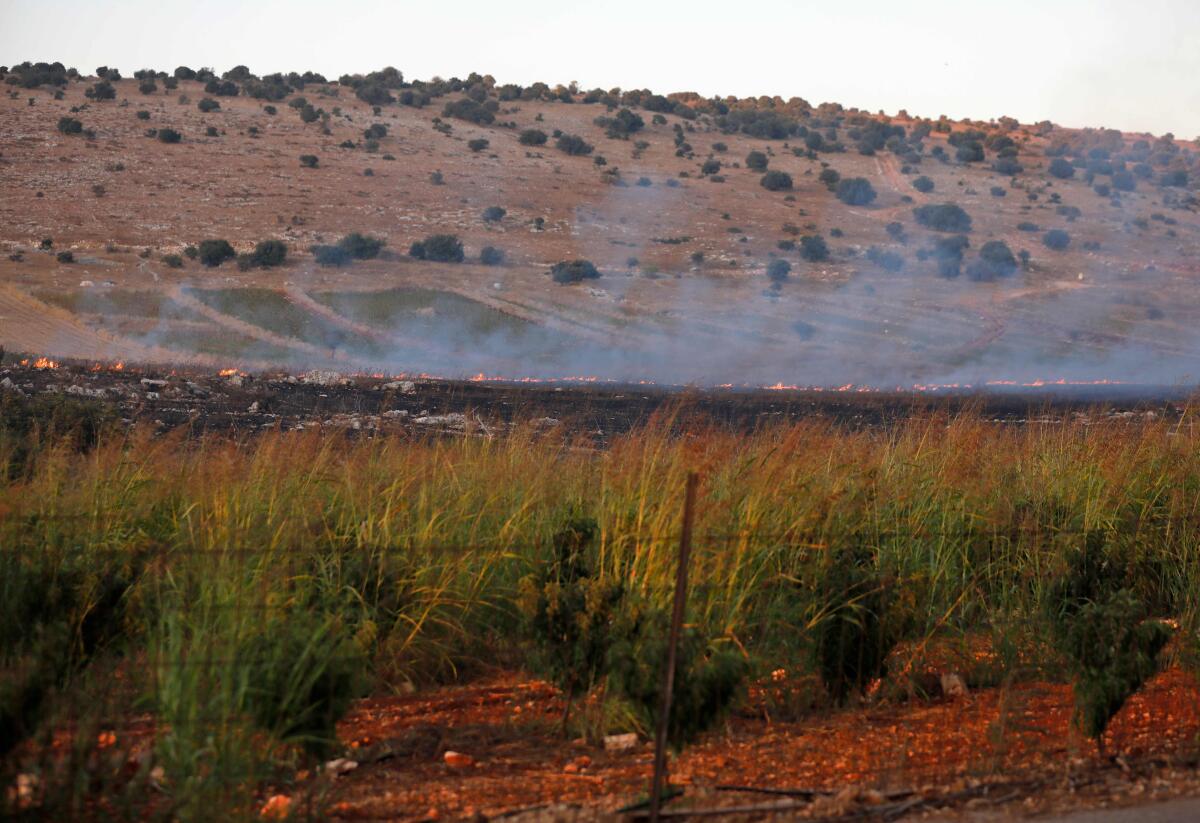Hezbollah and Israel trade fire near Lebanese-Israeli border, stoking fears of an escalating battle

JERUSALEM — In an escalation of hostility between Israel and Lebanon not seen since the war they fought in 2006, the Israeli military and the Lebanese paramilitary group Hezbollah traded attacks on Sunday.
Hezbollah, which is also a powerful Lebanese Shiite political faction, said in a statement that a squad of its fighters had destroyed “an armored vehicle on the road to the Avivim barracks, killing and wounding its occupants.”
Avivim is an Israeli village less than a mile from the border with Lebanon.
Israel’s military confirmed the flare-up, releasing a statement that said “a number of anti-tank missiles were fired from Lebanon towards an [Israel Defense Forces] base and military vehicles.”
“We returned fire toward the source of the attack in southern Lebanon,” it said.
“No Israelis were injured in the attack.”
Experts on the region said the two sides were still far from an all-out military conflict and that at least for now Hezbollah was unlikely to further provoke Israel.
“Both sides come out of this confrontation with something to brag about before their base,” said Joe Macaron, a resident fellow at the Arab Center in Washington, D.C. “Deterrence is back to business as usual on the Lebanese-Israeli border.”
The aggression by Hezbollah, which is backed by Iran, appeared to be retaliation for recent attacks in Lebanon and Syria that it says were carried out by Israel. Israel claimed responsibility only for the Syria attack, which it said was part of its fight against Iran and its affiliates.
In a televised speech on Saturday, Hezbollah’s head, Hassan Nasrallah, said “a response to the Israeli aggression is a matter that has been decided.”
“It will come from Lebanon... and from anywhere on the border,” Nasrallah said, adding that Israel “must pay a price.”
Two of Hezbollah’s missiles hit a building on a military base, while a third had struck a military ambulance at a battalion headquarters near Avivim, according to Jonathan Conricus, a spokesman for the Israeli military.
He said Israeli forces responded by launching more than 100 mortar shells and ordering residents of four Israeli towns to their shelters. Those orders were canceled by Sunday evening, as hostilities subsided.
Israeli Prime Minister Benjamin Netanyahu said in a press briefing that he had instructed the army “to prepare for any scenario.”
“We will decide regarding the continuation in accordance with developments,” he said.
“At this moment I can announce important news -- we have no casualties -- no injuries, not even a scratch.”
The Lebanese military reported in a statement “more than forty rocket, cluster and incendiary shells” on the border towns of Maron Al-Ras, Aitroun and Haroun.
Earlier on Sunday, an Israeli drone violated Lebanese airspace, dropping incendiary munitions and started a fire in an oak forest near the border, the Lebanese army said in a separate statement.
Images broadcast by Lebanese news channel Al-Mayadeen showed several smoke plumes rising from scorched fields near the border fence in southern Lebanon.
Lebanese Prime Minister Saad Hariri contacted U.S. Secretary of State Michael R. Pompeo as well as Emmanuel Bonne, an advisor to French President Emmanuel Macron, to request intervention by the international community.
Jason Greenblatt, the Trump administration’s special envoy for international negotiations, blamed Tehran for Hezbollah’s attack, saying in a tweet on Sunday, “Iran has proxies in Lebanon & Gaza that harm Israel, undermine chances for peace & threaten a better future for Palestinians.”
“The U.S.,” he added, “stands [with] Israel and fully supports its right to defend itself against all attacks.”
The United Nations’ peacekeeping mission in Lebanon’s south said it was in contact with the parties, “urging the maximum restraint and asked to cease all activities endangering the cessation of hostilities.’
The escalation comes a week after an early morning attack on Aug. 25 by two drones in the southern Dahiyeh district of Beirut. One of the drones crashed after experiencing a technical failure, while the second detonated near one of Hezbollah’s media centers.
Hezbollah blamed the attack on Israel, which has neither claimed nor denied responsibility. Nasrallah said it constituted “the first clear, big, dangerous, breach of the rules of engagement drawn up in 2006.”
He was referring to the month-long confrontation between Hezbollah and Israel, which killed almost 1,200 Lebanese, most of them civilians, as well as more than 160 Israelis, mostly soldiers.
Neither side appears interested in reliving that conflict. Macaron said Israel simply wants to set new rules for engagement rather than trigger a new war before its upcoming elections on Sept. 17.
Netanyahu, who in the last election mocked his opponents’ military credentials, has struggled to make headway against former army chief Benny Gantz, his chief opponent in the polls.
Gantz said in a statement Sunday that “Israel’s security forces can overcome any challenge and we do not recommend anyone put our capabilities to the test.”
More to Read
Sign up for Essential California
The most important California stories and recommendations in your inbox every morning.
You may occasionally receive promotional content from the Los Angeles Times.











